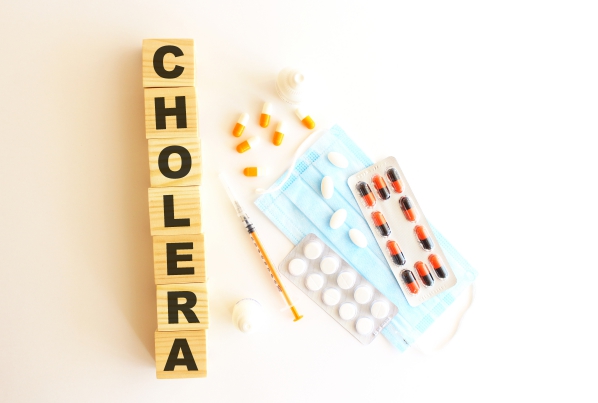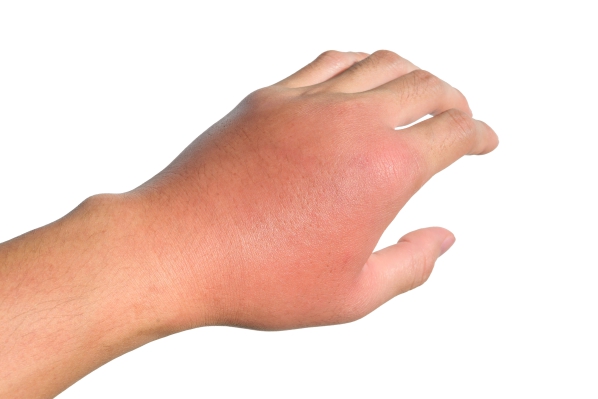What is cholera?
Cholera is a bacterial infection that affects the intestines. The bacterium that causes cholera is known as Vibrio cholerae. The characteristics of this condition are severe watery diarrhoea and dehydration. If left untreated, it may be fatal within hours. It is mainly transmitted through contaminated water.
Cholera has now been virtually eliminated in industrialized countries due to modern sewage and water treatment. However, it is still present in countries such as Africa, Haiti and Southeast Asia. This condition is more prevalent in areas where there is war, poverty and crowded environments without proper sanitation.
Cholera can be easily treated by taking an adequate amount if rehydration fluids.
What are the causes of cholera?
Vibrio cholerae releases toxins in the intestines which causes the body to secrete a very large amount of water, leading to diarrhoea. In addition, this causes a rapid loss of salts and fluids. The infection is spread via stools of infected people which contaminates food and water supplies. People infected with the bacterium are often unaware that they are infected. However, the bacterium is shed in their stool for 7-14 days which may contaminate water supplies. Vibrio cholerae can be found in:
- Contaminated water: Contaminated public wells or other water supplies are common sources of large-scale outbreaks of cholera. Areas where people live in crowded conditions without proper sanitation are higher risk of contracting cholera.
- Raw fruits and vegetables: Fruits and vegetables that are eaten raw are common sources of Vibrio cholerae in areas where there is cholera.
- Seafood: Eating undercooked or raw seafood coming from certain places can predispose you to cholera.
- Inadequate hygiene: Infected people should have a good hand hygiene after passing bowel movements as they can contaminate food.

What are the risk factors for cholera?
There are several factors which may increase your risk of developing cholera and these include:
- Poor sanitary conditions: Cholera flourishes in places where there is improper sanitary conditions such as in refugee camps, countries affected by poverty and regions affected by war, famine and natural disasters.
- Blood group O: People with the blood group O are two times more at risk of developing cholera compared to people with other blood groups.
- Reduced or no stomach acid: Stomach acid acts as a natural defence against cholera as the bacterium cannot survive in acidic conditions. People with reduced or no stomach acid- children, older adults and people taking medications to reduce stomach acid such as proton pump inhibitors or H2 blocker- are at increased risk of developing cholera.
- Living with someone who is affected by cholera, increases your risk of developing the disease.
- Eating raw or undercooked seafood.

What are the signs and symptoms of cholera?
The signs and symptoms of cholera include:
- Diarrhoea: The diarrhoea associated with cholera is severe and watery which occurs suddenly. As a result, there is a significant and rapid loss of water and salts.
- Dehydration: Due to the rapid loss of water and salts, severe dehydration occurs which could be deadly. It occurs within hours after the signs and symptoms of cholera appear. Usually, a loss of more than 10% of the body weight indicates severe dehydration. Other signs and symptoms of cholera which occurs due to dehydration include extreme thirst, dry skin, dry mouth, an irregular heartbeat, low blood pressure and little or no urination.
- Nausea.
- Vomiting.
- Muscle cramps: Rapid loss of sodium, potassium and chloride lead to muscle cramps.
- Shock: Shock is the most dangerous complication of dehydration and occurs when your blood volume decreases to a point that it leads to a drop in blood pressure. Consequently, there is a decrease in oxygen delivery to your organ systems. If left unaddressed, it can lead to death within minutes.

Making a diagnosis

To make a diagnosis, your doctor will first take a detailed history from you to know more about your symptoms. After the history taking, your doctor will perform a thorough physical examination to look for signs of cholera. To confirm the diagnosis, your doctor will order some tests and these include:
- Stool examination: A sample of stool is taken and examined under the microscope to look for the bacterium Vibrio cholerae.
- Stool culture: This test involves your doctor taking a sample of your stool to place it in a substance where the bacterium can grow so that it can be identified. This is the gold standard for the diagnosis of cholera.
- Serotyping and biotyping: These involves your doctor placing a substance called an antiserum specific for the bacterium into a sample containing the bacterium which will immobilized the organism, hence, confirming the diagnosis.
- Blood tests: These are done to assess your blood volume which decreases due to dehydration.
- Metabolic panel: Measurement of sodium, potassium and other salts are essential so that your doctor can replace them when giving intravenous fluids.
What are the treatments of cholera?
The treatment of cholera include:
- Rehydration: The main of the treatment of cholera is to replace the lost fluids and salts using a rehydration solution known as oral rehydration salts (ORS). It is available as a powder that is mixed with clean water. In people who are suffering from vomiting or severe dehydration, intravenous fluids are given.
- Antibiotics: Antibiotics can be given to reduce the time taken for recovery and relieve the cholera-related diarrhoea.
- Zinc supplements: Zinc supplements have shown to shorten the time taken for recovery and reduce the cholera-related diarrhoea.

What are the complications of cholera?
If cholera is left untreated, the following complications may ensue:
- Death.
- Low blood sugar level.
- Low potassium level.
- Kidney failure.
Expectations (prognosis)
With advancement in treatment of cholera, the mortality for severe cholera has decreased considerably. The mortality rate is higher in vulnerable groups such as pregnant women and children. Despite having the highest reported death rates, there has been a marked decrease in fatality rates in Africa since 1970. Seeking medical advice early is key for a favourable outcome.

Source:
J. Alastair, I. and Simon, M., 2016. Davidson's Essentials of Medicine. 2nd ed. London: ELSEVIER.
Parveen, K. and Michael, C., 2017. Kumar & Clarks Clinical Medicine. 9th ed. The Netherlands: ELSEVIER.
Handa, S., 2021. Cholera.
Centers for Disease Control and Prevention. Cholera.
Kenneth Todar. Todar's Online Textbook of Bacteriology








